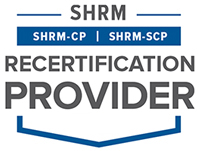+1-800-385-1627
support@hrtrainonline.com
0 items
Travel Pay - 2023 Update, Overview and Simplification of Federal Taxation Rules
90 Minutes
6 months
32899

Group Attendees: Any number of participants
Recorded Version: Unlimited viewing for 6 months ( Access information will be emailed 24 hours after the completion of live webinar)

The use of this seal confirms that this activity has met HR Certification Institutes (HRCI) criteria for recertification credit pre-approval.
This activity has been approved for
1.5 HR
(General) recertification credit
 HRTrainOnline is recognized by SHRM to offer Professional Development Credits (PDCs) for the SHRM-CP® or SHRM-SCP®.
?
HRTrainOnline is recognized by SHRM to offer Professional Development Credits (PDCs) for the SHRM-CP® or SHRM-SCP®.
?
1-hour and 15 minute concurrent conference session = 1.25 PDCs.
3-hour e-learning course = 3 PDCs.
Most employers send workers out to travel for a variety of reasons. But most every worker commutes to the office. Perhaps they travel from home on dispatch. Businesses can ask workers to travel from the office during the day for sales/service calls, errands, shopping, etc. Longer term travel includes conferences, long distance sales calls,, setting up stores, entertaining prospective clients and many other purposes.
Why should you Attend: The rules are many and varied. No one audio conference could possibly explain all of them. Limits and other rules are updated every year. However, basic rules of thumb can be applied to travel pay, similar to rules of thumb for all fringe benefits. In addition to the basic rules of thumb, generalizations can be made as to the following;- Which are taxable to the worker, and which can be excluded as legitimate business expenses?
- What limits apply to which types of travel pay?
- What are the rules for accounting and documentation?
- What about business income taxes and duductability?
- What is the delineation between short term vs long term travel?
- What are the best practices for employers to follow?
- What is new for 2023?
There are many areas which require extensive discussion on the details. So Mark has spent many hours organizing, summarizing and presenting these details relevant to most businesses. The topics which are discussed in detail include:
- The FLSA - what are the oldest rules concerning travel related expenses and what makes compensable time?
- Per Diems - what are they and when SHOULD employers use them? Where do you find applicable per diem rates given the wide range of expense costs throughout the US and it’s territories?
- Meals and Entertainment - When must they be taxed to the worker?
- Transportation expenses: What is considered a deductible commute expense? What is the difference in valuation of employee use of a company car vs business use of an employee car?
Areas Covered in the Session:
- What is new for 2023
- Business Income Tax overview for travel pay
- Accountable Plans - How to avoid all expense reimbursements becoming taxable wages to your workers
- The FLSA and its requirements including compensable time
- The “tax home” designation and the difference between short and long-term travel
- Per Diems and how they can make life easier for employers and employees alike
- Meals and Entertainment - how these are often abused by employees and employers. Know the rules before getting red-flagged by the IRS
- Transportation expenses - how short term travel is regulated
- A/P vs payroll communication – crucial for compliance
Who Will Benefit:
- Payroll and HR managers and staff
- Compensation and hiring staff
- Finance and Operational managers
- Executive Staff
 Mark Schwartz is an employment tax specialist and has over 15 years of employment tax experience as an independent consultant and as a payroll tax auditor with the State of California. He has managed an audit caseload of 20 ongoing audits, from small home-based businesses to large multi-national corporations. He is expert at defining regulatory and statutory requirements from local, State and Federal government agencies; and helping the average businessperson understand what that means to their business. He has processed weekly and bi-weekly payroll checks plus tax forms for businesses with hourly as well as exempt workers, multistate operations and a wide variety of benefits.
Mark Schwartz is an employment tax specialist and has over 15 years of employment tax experience as an independent consultant and as a payroll tax auditor with the State of California. He has managed an audit caseload of 20 ongoing audits, from small home-based businesses to large multi-national corporations. He is expert at defining regulatory and statutory requirements from local, State and Federal government agencies; and helping the average businessperson understand what that means to their business. He has processed weekly and bi-weekly payroll checks plus tax forms for businesses with hourly as well as exempt workers, multistate operations and a wide variety of benefits.
Mr.Schwartz provides consulting services encompassing payroll processing and payroll tax issues. These include payroll tax minimization, payroll tax compliance reviews, independent contractor studies, use of electronic transfers, deductions, benefits, etc. Mark has represented both clients and the State in front of the State Appeals Board. He understands the complexities of local wage laws, unemployment and disability claims, and other wage and benefit issues affecting your employees.
Mark prides himself on his outstanding customer service skills. He listens attentively to his clientele, helping them bridge the gap between the small business world and Government bureaucracy. He eagerly assists with clients needs and feels that educating clients toward faster, accurate and more complete payroll processes provide the most value.
Mark is a participating member of the American Payroll Association. He earned his BA and MBA in Finance at Santa Clara University. He has held Certified Internal Auditor and Certified Investment and Derivatives Auditor Credentials. Mark is currently pursuing a Certified Payroll Fundamentals Credential with the American Payroll Association.
